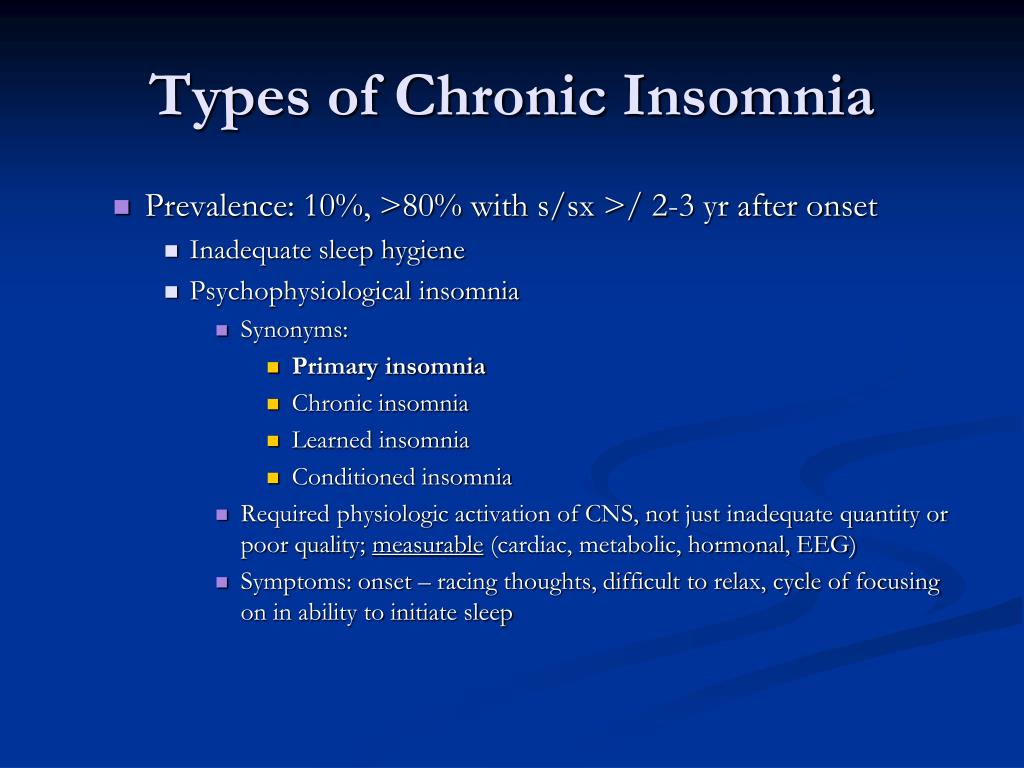

- #LIST OF TYPES OF INSOMNIA HOW TO#
- #LIST OF TYPES OF INSOMNIA TV#

However, there are also some strategies you can consider that may help you get better sleep. It’s typically recommended that you talk to your doctor or another qualified healthcare provider if you’re experiencing a medical condition like this, as they may recommend sleep medicine or similar options. The best way to overcome insomnia depends on the cause(s), symptoms, and severity.
#LIST OF TYPES OF INSOMNIA HOW TO#
11 Tips For How To Deal With Insomnia Naturally

Discover the natural treatment for insomnia listed below. This guide features science-backed tips, from sleep schedules to online therapy, that may help you overcome your insomnia. This could help inform what treatment options are the most appropriate for your situation including over the counter medications, prescription sleeping pills, a sleep clinic, or a natural remedy from our list below. They may begin by having you keep a sleep diary to track when you’re sleeping and for how long.
#LIST OF TYPES OF INSOMNIA TV#
Habits and environmental factors, including daytime naps, irregular sleeping and waking times, watching TV in bed, an overstimulating sleep environment, sleeping in a warm room, and not winding down before bed.ĭepending on your severity level, you may want to consult your primary care doctor for treatment options. Medications like decongestants, bronchodilators, antidepressants, steroids, beta-blockers, diuretics, central nervous system stimulants, and previous use of sleep medications. Stimulants and substances such as caffeine, nicotine, and alcohol. Neurological disorders like Parkinson's disease, strokes, and dementia. Medical illnesses including acid reflux, heartburn, chronic obstructive lung disease, asthma, congestive heart failure, hot flashes, arthritis, chronic pain, benign prostatic hyperplasia (BPH), and overactive thyroid. Other sleep wake disorders like obstructive sleep apnea, periodic limb movement disorder, and restless leg syndrome. Psychological conditions or mental disorders such as depression, anxiety, stress, bipolar disorder, and over-stimulation. Possible situations that could affect sleep include: Insomnia can have a wide variety of different causes, which is part of why it can take time and some experimentation to find the treatment or strategy that works to address it. Irritability, disturbed mood, hyperactivity, or aggressiveness. Decreased work, school, or social performance. Waking up earlier than desired or in the middle of the night. Symptoms of insomnia may include the following: Researchers estimate that approximately 40% of people with insomnia also have a concurrent mental health condition like depression. One example of comorbid insomnia is that which occurs alongside depression. There’s also primary insomnia, which exists without the presence of other conditions or diseases, and comorbid insomnia, which occurs simultaneously with other conditions or diseases. Chronic insomnia, when sleep difficulties persist for more than six months. Short-term insomnia, when sleep difficulties last between one and six months. Transient insomnia, when sleep difficulties last for less than one month at a time. The various types of insomnia are usually categorized based on how long they last, such as: Insomnia is classified as a sleep disorder, and its primary manifestation is difficulty falling and/or staying asleep.







 0 kommentar(er)
0 kommentar(er)
